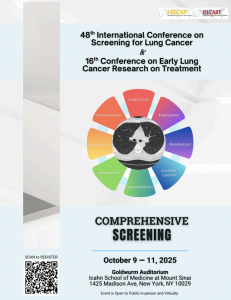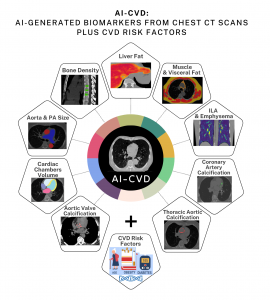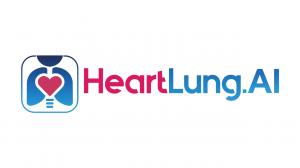AI-CVD Investigators to Present at I-ELCAP’s 48th International Conference on Screening for Lung Cancer, Oct 9–11 in NYC
AI-CVD at I-ELCAP highlights a single low-dose CT that bridges lung cancer screening and cardiovascular prevention—register for in person or virtual attendance.
AI-CVD bridges cardiovascular disease (CVD) and lung cancer prevention by turning every low-dose chest CT into a dual-purpose screen”
NEW YORK CITY, NY, UNITED STATES, October 2, 2025 /EINPresswire.com/ -- AI-CVD investigators will join global experts at the International Early Lung Cancer Action Program (I-ELCAP) 48th International Conference on Screening for Lung Cancer & 16th Conference on Early Lung Cancer Research on Treatment, held October 9–11, 2025 at Goldwurm Auditorium, Icahn School of Medicine at Mount Sinai, 1425 Madison Ave, New York, NY 10029. The meeting is open to the public for in-person and virtual attendance. — Morteza Naghavi, M.D.
Dr. Morteza Naghavi, President of HeartLung AI, and Principal Investigator of AI-CVD studies will present during the “AI-CVD Working Group” segment of Session 8 on Friday, October 10 from 10:15–11:00 a.m. ET. (Per the published agenda.)
“AI-CVD bridges cardiovascular disease (CVD) and lung cancer prevention by turning every low-dose chest CT into a dual-purpose screen,” said Morteza Naghavi, MD. “From coronary and thoracic aortic calcium to emphysema, liver fat, and bone health, we surface clinically meaningful risk signals from a single scan—so health systems can advance opportunistic prevention for heart disease and lung cancer together.”
Integrating CVD screening into lung cancer screening programs is critically important because the majority of individuals at risk for or diagnosed with lung cancer are also at high risk of dying from cardiovascular causes. In fact, epidemiological studies show that more lung cancer screening participants ultimately die from CVD than from lung cancer itself. Low-dose CT scans, already being performed for lung cancer detection, provide a powerful opportunity to simultaneously identify silent but life-threatening cardiovascular conditions such as coronary artery calcification, aortic enlargement, and cardiac chamber abnormalities—without additional cost, time, or radiation exposure. By leveraging the same scan to detect both cancer and cardiovascular disease, healthcare systems can not only improve early detection and prevention but also reduce overall mortality, maximize the value of screening programs, and address two of the leading causes of death in one unified approach.
About AI-CVD
AI-CVD™ is a comprehensive suite of AI-powered tools designed to opportunistically analyze cardiac and lung CT scans, specifically those acquired for CAC scoring or lung cancer screening. It enables the detection of subclinical markers associated with cardiovascular and cardiometabolic diseases. AI-CVD™ leverages advanced algorithms to analyze CT scans, identifying hidden heart risks and enabling early intervention. This comprehensive approach underscores HeartLung's commitment to revolutionizing preventive healthcare through innovative AI technologies.
The AI-CVD Investigators represent a world-class network of pioneers in cardiovascular and thoracic imaging, preventive cardiology, epidemiology, and artificial intelligence. Drawn from leading institutions such as Boston University, Mount Sinai, Stanford, UCLA, UC Irvine, Cornell, Houston Methodist, Cedars-Sinai, and University Medical Center Groningen, this group has collectively advanced many of the breakthroughs that define modern preventive medicine. Their unique collaboration bridges cardiology and pulmonology, reflecting the reality that many patients undergoing lung cancer screening ultimately die of cardiovascular disease. By uniting expertise in heart and lung imaging with cutting-edge AI methods, the AI-CVD consortium is shaping a new era of opportunistic screening where a single low-dose CT scan can simultaneously guide prevention of both CVD and lung cancer — the top two killers worldwide.
Alphabetic Order:
· Emelia J. Benjamin, MD, ScM — Robert Dawson Evans Distinguished Professor of Medicine; Professor of Epidemiology; Cardiologist at Boston Medical Center, Boston University Chobanian & Avedisian School of Medicine and BU School of Public Health, Boston, MA, USA.
· Andrea D. Branch, PhD — Professor of Medicine (Division of Liver Diseases); Associate Professor of Surgery, Icahn School of Medicine at Mount Sinai, New York, NY, USA.
· Matthew J. Budoff, MD, FACC, FAHA — Professor of Medicine, David Geffen School of Medicine at UCLA; Endowed Chair of Preventive Cardiology & Program Director, Cardiac CT, Harbor-UCLA / The Lundquist Institute, Torrance/Los Angeles, CA, USA.
· Zahi A. Fayad, PhD — Lucy G. Moses Professor of Medical Imaging & Bioengineering; Professor of Radiology & Medicine (Cardiology); Director, Biomedical Engineering & Imaging Institute, Icahn School of Medicine at Mount Sinai, New York, NY, USA.
· Claudia I. Henschke, MD, PhD — Professor of Radiology; Head, Lung & Cardiac Screening Program, Icahn School of Medicine at Mount Sinai, New York, NY, USA.
· Robert A. Kloner, MD, PhD — Chief Science Officer & Director of Cardiovascular Research, Huntington Medical Research Institutes; Professor of Medicine (Clinical Scholar), Keck School of Medicine of USC, Pasadena/Los Angeles, CA, USA.
· David J. Maron, MD — C.F. Rehnborg Professor of Medicine; Chief, Stanford Prevention Research Center, Stanford University School of Medicine, Stanford, CA, USA.
· Michael V. McConnell, MD, MSEE — Professor of Cardiovascular Medicine (and by courtesy, Electrical Engineering & Molecular & Cellular Physiology), Stanford University School of Medicine, Stanford, CA, USA.
· Jeffrey I. Mechanick, MD — Professor of Medicine; Medical Director, Marie-Josée & Henry R. Kravis Center for Cardiovascular Health; Director of Metabolic Support (Endocrinology), Icahn School of Medicine at Mount Sinai, New York, NY, USA.
· Roxana Mehran, MD — Endowed Mount Sinai Professor in Cardiovascular Clinical Research & Outcomes; Professor of Medicine (Cardiology) and Population Health Science & Policy; Director, Interventional Cardiovascular Research & Clinical Trials, Icahn School of Medicine at Mount Sinai, New York, NY, USA.
· Morteza Naghavi, MD — Founder & President/CEO, HeartLung.AI, Houston, TX, USA.
· Khurram Nasir, MD, MPH, MSc — William A. Zoghbi Centennial Chair in Cardiovascular Health; Chief, Cardiovascular Disease Prevention & Wellness (Houston Methodist); Professor of Medicine, Weill Cornell Medicine, Houston, TX, USA.
· Jagat Narula, MD, PhD — (Current) Executive Vice President & Chief Academic Officer, UTHealth Houston; (Former) Philip J. & Harriet L. Goodhart Chair of Cardiology; Professor of Medicine, Radiology & related disciplines, Icahn School of Medicine at Mount Sinai. Houston, TX / New York, NY, USA.
· Jamal S. Rana, MD, PhD, FACC — Chief of Cardiology, Kaiser Permanente Oakland Medical Center; Assistant Physician-in-Chief (Medical Specialties), The Permanente Medical Group, Oakland, CA, USA.
· Anthony P. Reeves, PhD — Professor, Electrical & Computer Engineering (with affiliations in Radiology), Cornell University, Ithaca, NY, USA.
· Prediman K. Shah, MD — Professor of Cardiology; Director, Atherosclerosis Prevention & Management Center, Smidt Heart Institute, Cedars-Sinai Medical Center, Los Angeles, CA, USA.
· Rozemarijn Vliegenthart, MD, PhD — Professor of Cardiothoracic Imaging; Radiologist; President, European Society of Cardiovascular Radiology, University Medical Center Groningen (UMCG), University of Groningen, Groningen, Netherlands.
· Nathan D. Wong, PhD, MPH, FACC — Professor of Medicine; Director, Heart Disease Prevention Program (Preventive Cardiology), University of California, Irvine; Adjunct Professor of Epidemiology (UCLA/UC Irvine), Irvine & Los Angeles, CA, USA.
· David F. Yankelevitz, MD — Professor of Radiology; Director, Lung Biopsy Service, Icahn School of Medicine at Mount Sinai, New York, NY, USA.
· Javier J. Zulueta, MD — Senior Faculty; Chief, Division of Pulmonary, Critical Care & Sleep Medicine (Mount Sinai Morningside), Icahn School of Medicine at Mount Sinai, New York, NY, USA.
About I-ELCAP
The International Early Lung Cancer Action Program (I-ELCAP) is a global collaborative network dedicated to research and implementation of a comprehensive approach to screening for early diagnosis and early treatment of lung cancer and other diseases identified on low-dose CT scans without contrast (www.ielcap.org). This collaborative network of over 90 institutions throughout the world has screened over 100,000 participants and has reported short- and long-term results in over 300 publications.
About HeartLung AI
HeartLung leverages AI technology for the early detection and prevention of heart disease, lung cancer, emphysema/COPD, osteoporosis, myosteatosis, fatty liver disease, and other life-threatening conditions. HeartLung has received FDA "Breakthrough Designation" for AutoChamber™, an AI tool that identifies enlarged cardiac chambers and left ventricular hypertrophy in non-contrast chest CT scans, which are typically undetectable by the human eye. The AutoChamber™ AI also works on low-dose CT for lung cancer screening as well as contrast-enhanced coronary CT angiography (CCTA) scans. Additionally, HeartLung has obtained FDA 510(k) clearance for AutoBMD™, the only DEXA-equivalent, CT-based opportunistic osteoporosis screening approved by the FDA, applicable to over 25 million CT scans annually and reimbursed by Medicare. HeartLung is also awaiting FDA approval for AI-CVD™, a suite of AI modules including AI-CAC™ (AI-enabled Coronary Artery Calcium Scoring), aimed at early detection and prevention of cardiovascular disease using widely available CT scans.
Event details
Dates: October 9–11, 2025
Venue: Goldwurm Auditorium, Icahn School of Medicine at Mount Sinai, 1425 Madison Ave, New York, NY 10029
Agenda (PDF): https://www.ielcap.org/wp-content/uploads/IELCAP-48th-Conference-Agenda.pdf I-ELCAP
Register (in-person or virtual): https://mountsinai.zoom.us/webinar/register/WN_OIM-moKuRQGrjfEv5kicGg#/registration
Marlon Montes
HeartLung Technologies
+1 310-510-6004
email us here
Visit us on social media:
LinkedIn
X
Legal Disclaimer:
EIN Presswire provides this news content "as is" without warranty of any kind. We do not accept any responsibility or liability for the accuracy, content, images, videos, licenses, completeness, legality, or reliability of the information contained in this article. If you have any complaints or copyright issues related to this article, kindly contact the author above.



